Aroog Khaliq examines human nature through writing, psychology, and medicine
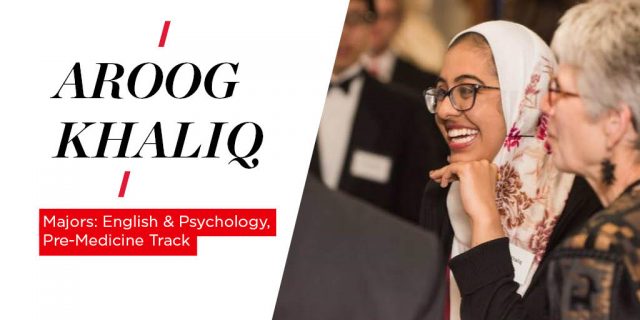
Where are you from? And why did you decide to come to KU?
My hometown is Overland Park, KS. I really ended up at KU in a miraculous way; I hadn’t even seen more than two buildings on campus before I committed to the University, and even during summer Orientation, I didn’t go on a full “tour.” My first and last interaction before enrollment with KU was through the Hall Center, where a group of students from my high school and I were invited to meet Krista Tippett, and a brief visit with some of the lovely honors faculty. Those few interactions were so warm and rich that it wasn’t too difficult thereafter for me to take the plunge and become a Jayhawk.
Why did you choose your majors? And how do they complement each other? Was there a moment when you decided this is what you wanted to study? What was that journey like?
English is something that has always been integral to my life. I read early and I read a lot, and that voraciousness made me a permanent fixture at my local library. First, I was just a patron, and then, I became a volunteer that helped with everything from shelving books to organizing outreach programs to interviewing visiting authors. The library also had a program where local teens could review advanced reader’s copies, and that was really my first foray into writing about writing, and learning what constituted “good writing.” I carried all of these experiences with me from middle school to high school, and my current interests in editing, poetry, and opinion writing can all be tied back to the library and the wonderful mentors who encouraged me there.
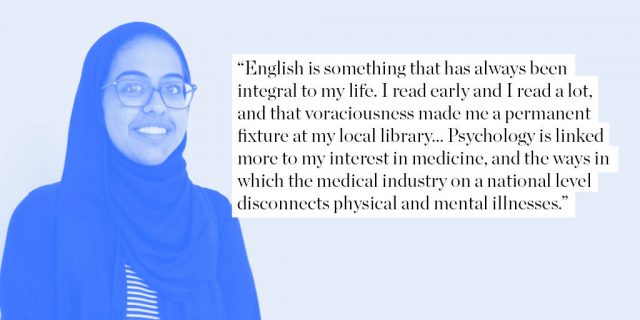
Psychology is linked more to my interest in medicine, and the ways in which the medical industry on a national level disconnects physical and mental illnesses. I’ve shadowed in cardiology clinics for several years now, and I’ve volunteered in neurology units in hospitals as well, and my time in both places has reinforced my belief in holistic treatment. Patients are people, not the area of their bodies that they have complaints with, and gaining a better, more scientific understanding of people is what psychology is all about. If more pre-med students took a moment to appreciate the linkage between physical and mental ailments beyond the errant case of phantom limb syndrome, I think the future of medicine would be much brighter, and more empathetic.
What is the most exciting part of your majors? What do you think is most valuable about your experiences in these programs?
I think in the English department, the most exciting part is getting to see how differently each faculty member approaches a different author or period or topic in teaching. The ability to quote authors at length, and in Old English to boot, is a great party trick, but more than that, it is an excellent demonstration of the depth and breadth of knowledge that these professors have. I am always adding to my reading list, thinking deeply and critically about texts that I used to snooze through in high school, and discovering the truly universal and timeless nature of literature, be it a poem or a novel or a play. None of those things would be possible without the dedication KU’s English professors have to their craft.
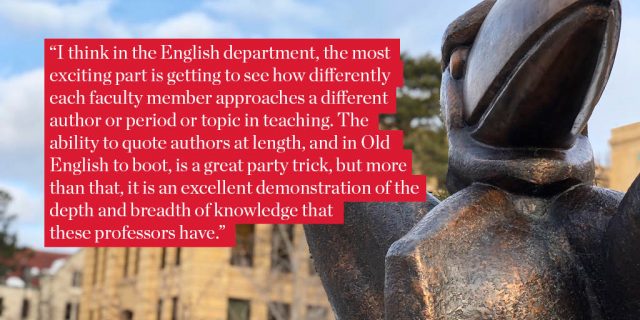
In the Psychology department, the professors are similarly awesome, but I think the value is most deeply ingrained in the material and the emphasis professors place in checking bias when it comes to not only the data but the way clinicians treat individuals with mental illness. The perception that individuals with mental illness are violent, for example, is refuted regularly, which makes this realm of the sciences most human and most humane, I think. In order to make KU grads the best clinicians they can be, the Psychology department ensures that we center empathy in our studies.
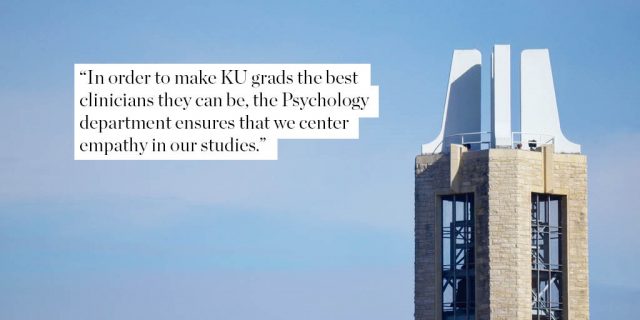
Is there a particular professor or mentor you’d like to give a shout out?
Mary Klayder! Her freshman honors seminar was the best thing that ever happened to me, and getting to come back my sophomore year as a teaching assistant was the brightest part of the fall semester. She is my rock, my guardian angel, and one of the best people on this campus and possibly this planet.
What is the benefit of being in the KU College alongside students studying sciences, arts and humanities?
I know the word interdisciplinary gets thrown around at every opportunity, but truly, that mixture of areas of focus is what makes KU College so unique. Wescoe alone is a great example of a building where you can find a class from nearly every field in action. I once got lost on my way back from my poetry workshop class and ended up in a room where some kind of math was being taught! You don’t get that experience anywhere else, really, and at the end of the day, if we burrow into a singular area of focus we won’t come out of our undergraduate experience as multifaceted as we all have the capability to be, and what a waste that is.
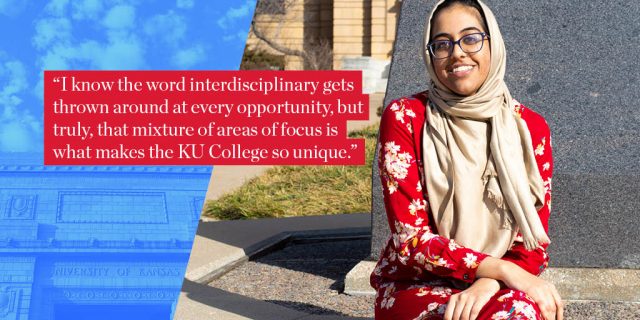
What has been your favorite class at KU? And why?
A tie between Dr. Kaminski’s poetry workshop and Dr. Barybin’s honors general chemistry II class. Every day in both classes was a gift, because I always walked out knowing more than I did walking in. Even when the material got tough or not entirely in my arena of interest, I felt confident that both professors would help me stay afloat.
What would you tell your freshman self?
When things get really tough, focus on putting one foot in front of the other and just finishing up the day. When you wake up, don’t just try doing things again, but try doing them differently, doing them better. Sleep more. Do the things you want to do, not the ones that everyone thinks are predestined for your track. Be as good a friend to yourself as you are to others. Embrace the athleisure look on 8 am lecture days. Microwave quesadillas are not a meal.
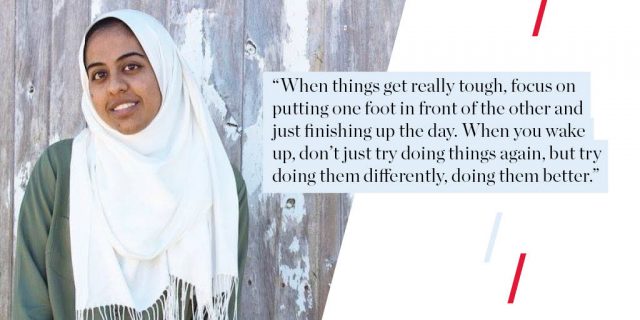
What can you tell us about being selected as a 2018-2019 Hall Center Scholar? What opportunities or interesting experiences have you had as a result of being selected by the Hall Center for the Humanities?
The Hall Center does many great things, but one of the most amazing things they do is bring in brilliant speakers. This semester, Maria Hinojosa and Neil Gaiman came to campus to discuss their new work, and Professor Marie Grace Brown presented her research on fashion and body politics in Sudan. Getting to discuss the work of these brilliant individuals either one on one with them or with faculty members is exciting, but even more exciting is getting to delve into these niche topics with the other Scholars, all of whom bring their unique outlook to the discussion. We get off topic quite a bit, but even our tangents leave me with something to pick apart further when we adjourn. No greater argument can be made for the humanities’ importance than this program and the Center’s tireless work.
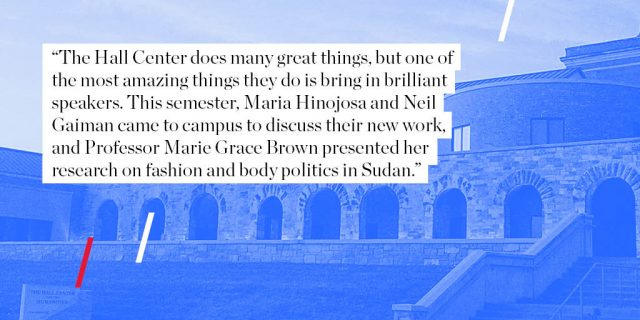
What do you want to do when you graduate?
Go to medical school, work with MSF, and publish another chapbook or two. Hopefully!
What motivates you?
Making Allah and my family and friends proud, foremost. Becoming a better poet, a better role model, a better person. Spreading empathy and happiness in a world of complacency.
Be like Aroog. Explore the ways that your interests compliment one another, and finds ways to spread empathy in all you do. For more information, visit the Department of English, the Department of Psychology, the University Honors Program, and the Hall Center for the Humanities at the University of Kansas.